What Tomorrow’s Retail Bag Looks Like
February 16, 2021
Hint: It’s not a single-use plastic bag.
12 minutes. That’s how long it typically takes from the moment we receive a single-use plastic bag to the moment we discard it. And those 12 short minutes barely register within the much longer life cycle of the plastic bag. The story of the plastic bag starts with extracting finite fossil fuels––like natural gas ––and usually ends in landfills, or worse, in our oceans, where they take decades to break down. It’s time that we identify a better, more resilient way forward for retail––one that maximizes valuable resources and benefits the customer, the retailer and the planet.
Every year, 100 billion single-use plastic bags are used annually in the U.S., and fewer than 10% of those are recycled. Plastic bags continue to be one of the top ten most littered items on our beaches, contributing to a mounting global waste crisis. And now, the urgency of these environmental challenges are coming head-to-head with a rapidly changing retail landscape, as a result of the COVID-19 pandemic. Stay-at-home mandates from many governments and work-from-home policies from many companies are driving the growth of e-commerce and digitization as consumer habits shifted almost overnight. This shake-up in retail norms presents the ideal moment for reinventing the single-use plastic bag through new business models and design innovation. If there was ever a time to rethink the status quo of our retail system, it is now.
The plastic bag plays a pivotal role in the retail experience; whether you’re buying groceries, ordering a shirt for delivery or picking up a prescription. It’s an extension of the store beyond its premises, and a convenience to the consumer, as we carry our goods home, pick them up from the curb or receive them at our doorsteps. To address the challenges of this shared experience around the plastic bag, we need a whole suite of solutions that can fit the varied retail contexts and customer needs across different geographic, social and economic environments.
This week, our Consortium to Reinvent the Retail Bag’s global innovation challenge, the Beyond the Bag Challenge, identified nine winning solutions that show the breadth and real-world promise of solutions that already exist to help reinvent retail and the plastic bag . Each brings a unique contribution to creating a new way to get our goods home, and together they can help pave the way forward, capitalizing on current market trends and shifting consumer habits in order to advance larger, industry-wide sustainable change.
Tracking the bag throughout its life
New digital technologies make it possible for customers and retailers to see well past the 12 minutes that elapse between the current checkout counter to disposal of today’s single-use plastic bag. They provide a clearer, more holistic picture of the lifespan of the bag, and with it, elevate the transparency of entire supply chains.
EON uses the Internet of Things (IoT) to help retailers track inventory, manage reverse logistics and understand how bags are used by monitoring impact data throughout the bag’s value chain, and extending lines of sight into their full lifecycle.
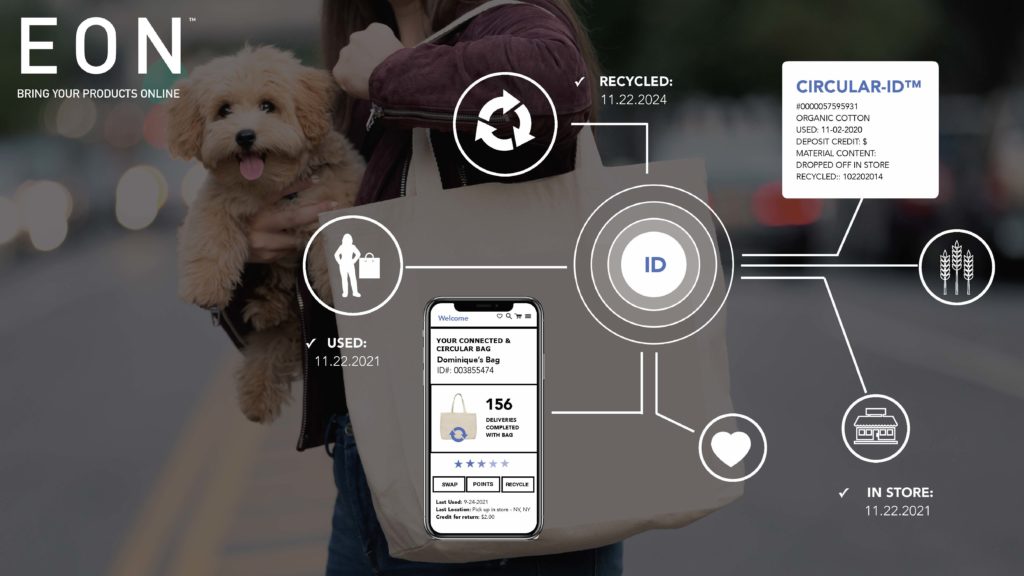
SmartC, a solution co-created by 99Bridges and Envision Charlotte, leverages IoT technologies to connect reusable bags, enabled by smart tags, at participating retail stores, allowing retailers to reward customers with points, coupons or discounts every time they reuse their shopping bags.
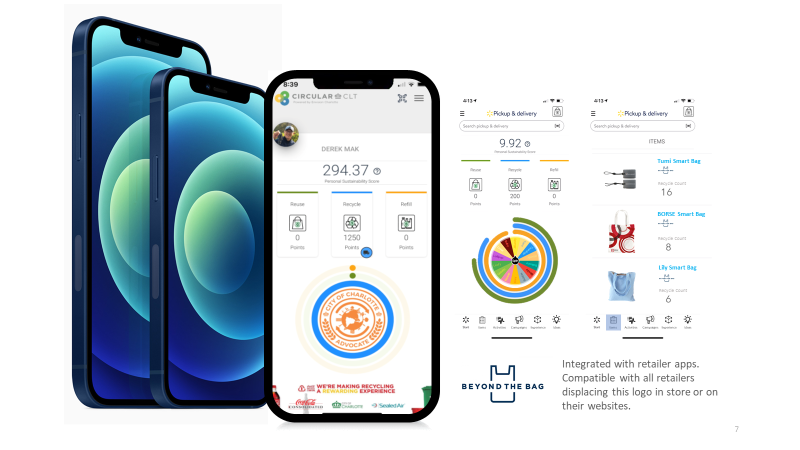
And what about all the existing reusable bags sitting in our closets? Fill it Forward created a tag that connects our bags to a mobile app where users track their environmental impact, help give back to charitable projects, and offer rewards that encourage reuse—significantly extending a bag’s lifetime.
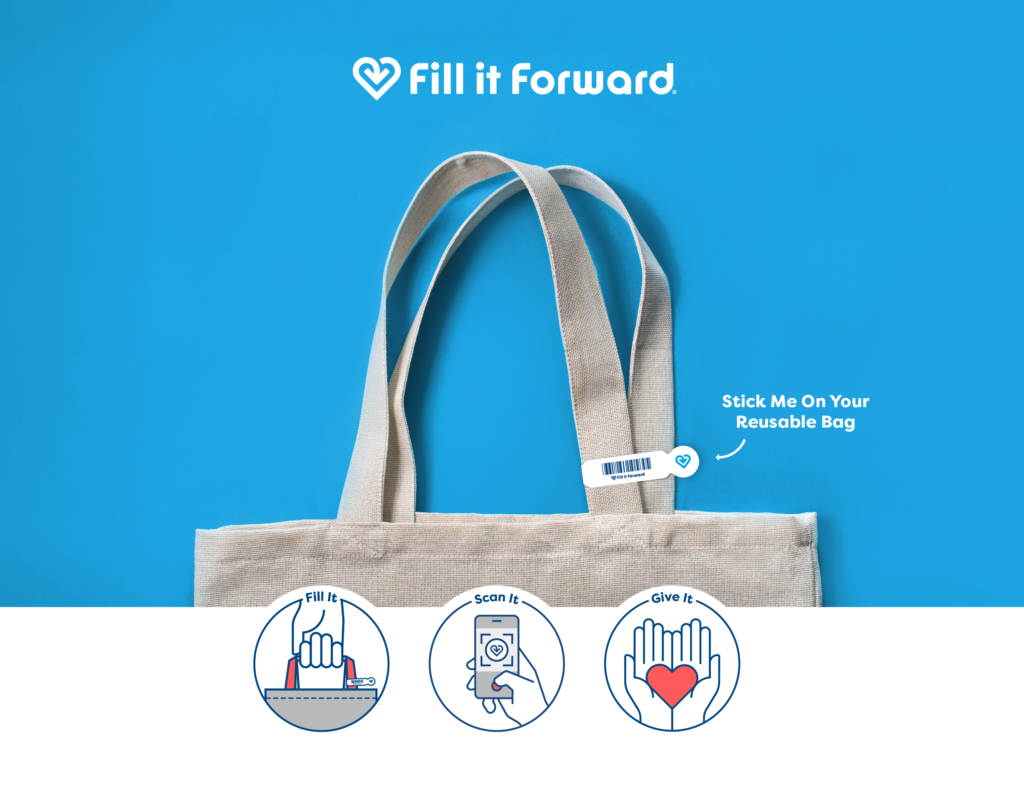
Meeting customer needs
Amidst a changing retail environment, these innovations recognize that habits are difficult to break, and to address this challenge, they have innovated around our lifestyles. Their Reuse models offer durable alternatives to the current retail bag, improving on the user experience not only from a performance standpoint, but from an environmental perspective too.
GOATOTE offers a kiosk system that provides us easy access to clean reusable bags, solving for those moments you do not have a reusable bag, but don’t want the trade-off of a single-use alternative offered at the store.
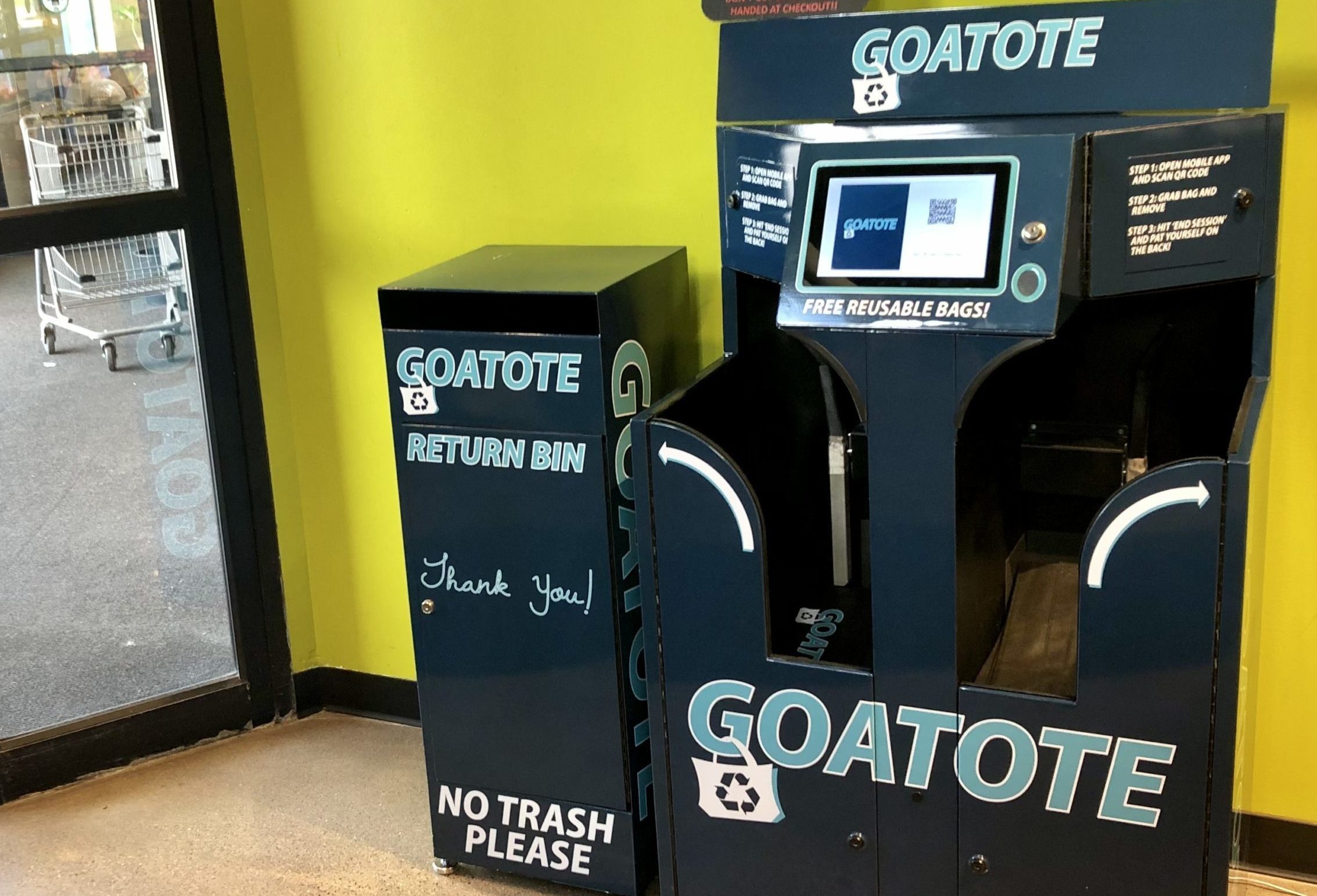
ChicoBag aims to have lightweight, compact, reusable bags readily available for a variety of customer interaction points––delivery, curb-side pick-up or in-store.
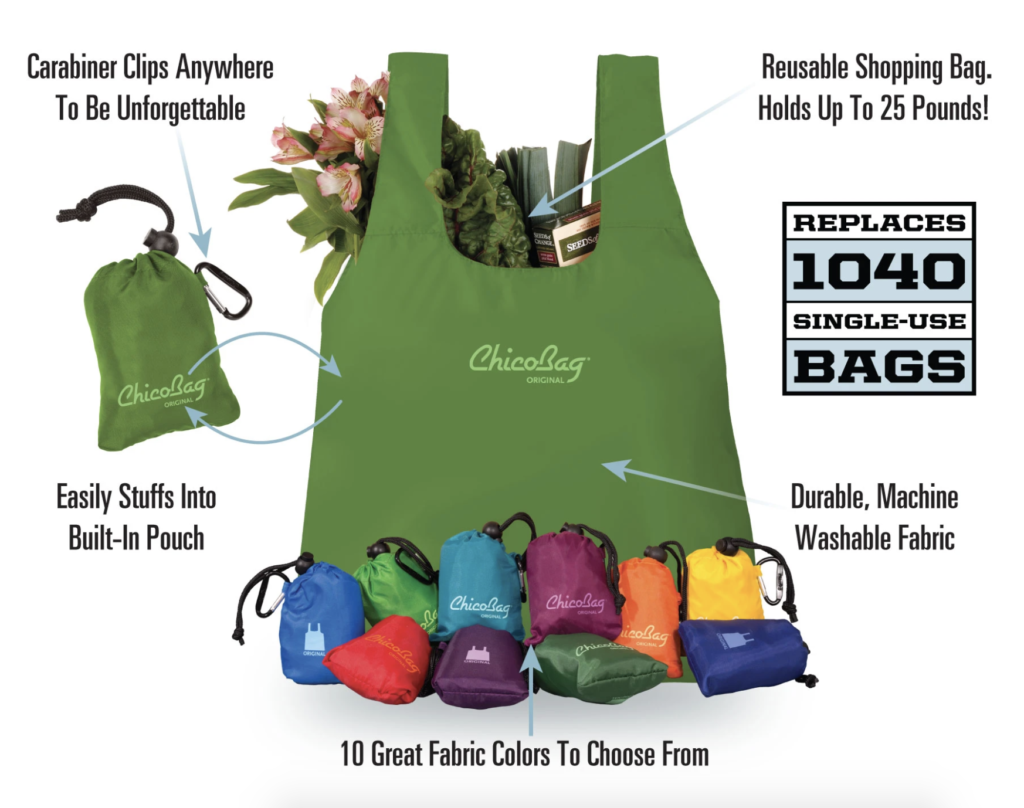
For those who shop online or use pick-up services, Returnity designs and manufactures reusable shipping bags and boxes for products already on the market, and provides the e-commerce and delivery packaging system that powers how these bags and boxes are used.
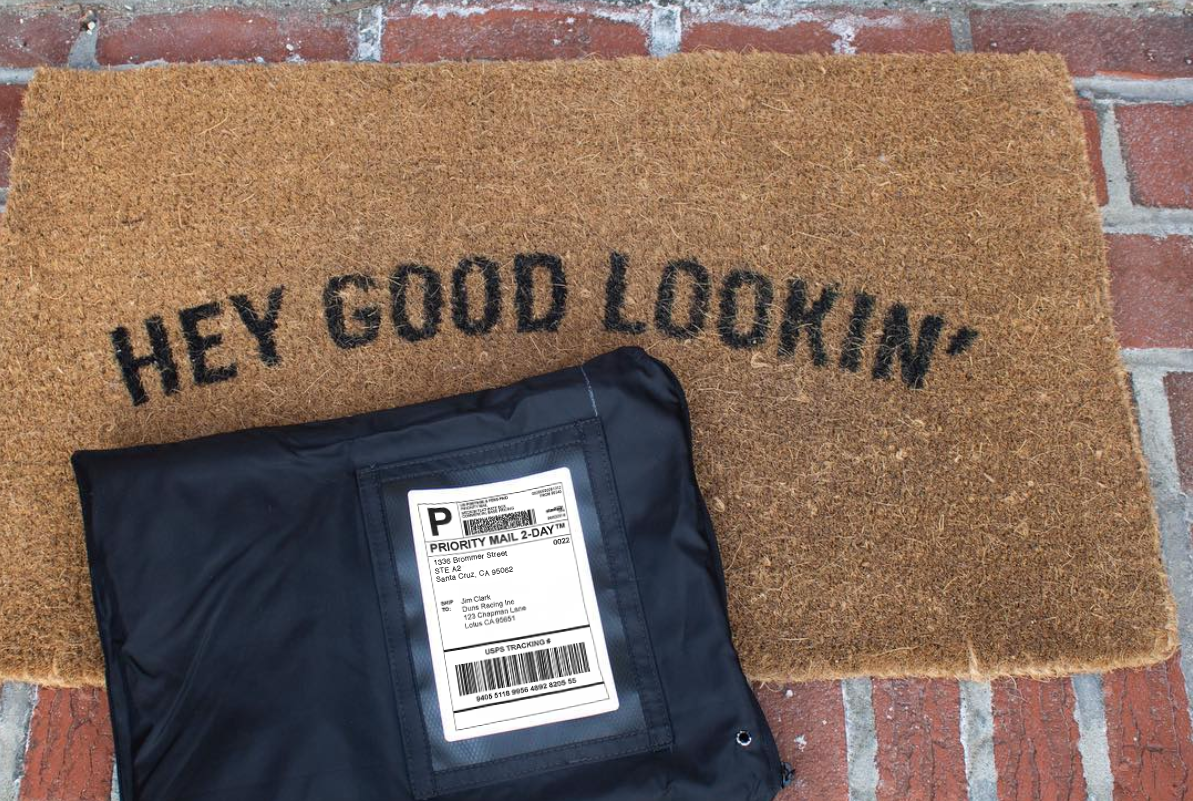
Aligning with existing retail operations
Some emerging innovators are focusing on material science innovations that result in bags that are indistinguishable from today’s plastic bag to a customer or retailer at checkout, but are sourced from renewable materials and follow different paths at end of use.
To replace traditional thin film plastics, Sway offers a seaweed-derived material that is bio-based and has the potential to be carbon-negative at scale. Their replacement matches the strength and performance of traditional plastic bags.
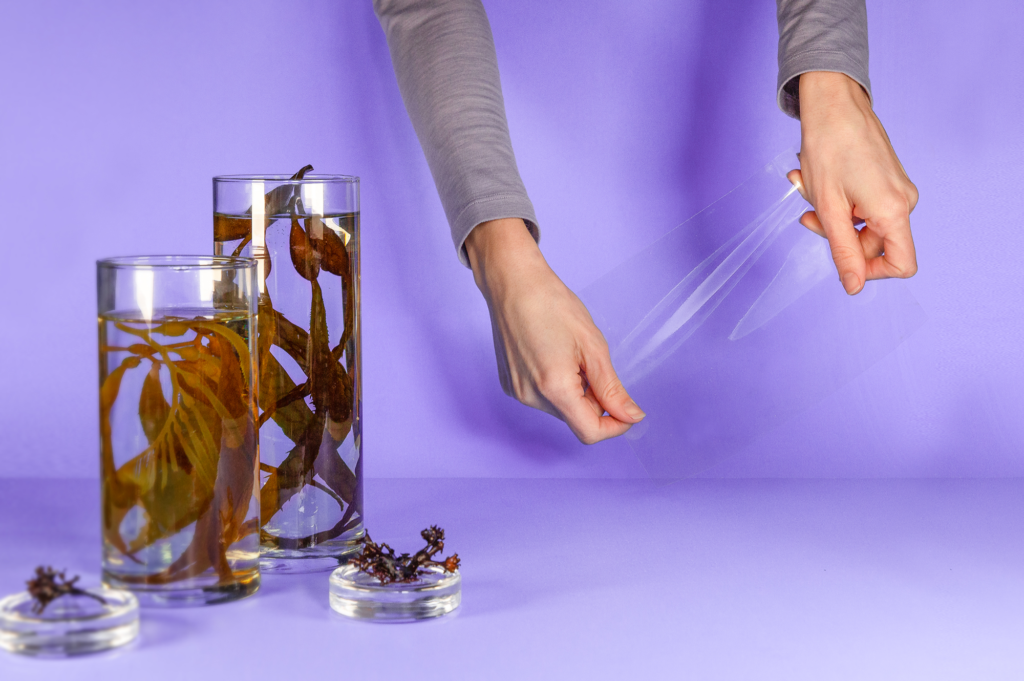
PlasticFri, on the other hand, sources starch from agricultural waste, creating a bio-based, compostable bag.
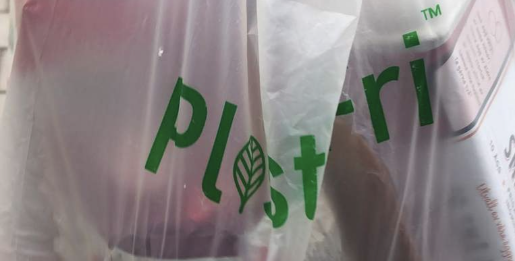
As an upgrade to traditional paper bags, Domtar is developing a new bio-based, recyclable material of 100% cellulose fiber that is stretchable and stronger, able to stand up to multiple uses. When considering which type of materials to introduce to a location, it is equally important to assess the availability of local curbside organics collection and anaerobic digestion and composting facilities, to ensure that these bags can be processed at end-of-life.
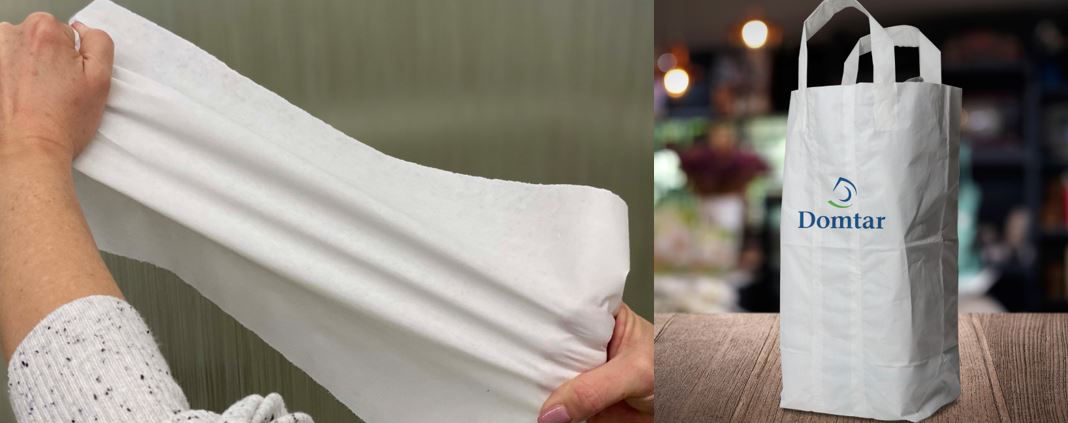
Today, the outsized impact of plastic bag waste demands innovative solutions. However, as companies work toward zero-waste goals, the packaging of items that go inside the bag is also an important consideration. In recognition of this, we are giving special recognition to two Beyond the Bag Challenge submissions as Circular Trailblazers. These companies are advancing refillable and reusable packaging systems for products across retail, from food to cleaning supplies, broadening the horizon for the waste-free future of retail. Algramo, a start-up based in Chile and now piloting in New York, has created a mobile dispensing system for personal care and cleaning products that allows shoppers to skip packaging all together. Loop, developed by TerraCycle, creates reusable and recyclable packaging alternatives for some well-known household products, eliminating the need for single-use packaging when customers visit a store, or deliver these items to their homes.
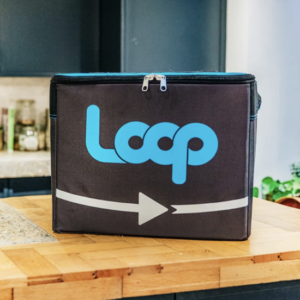 .
. 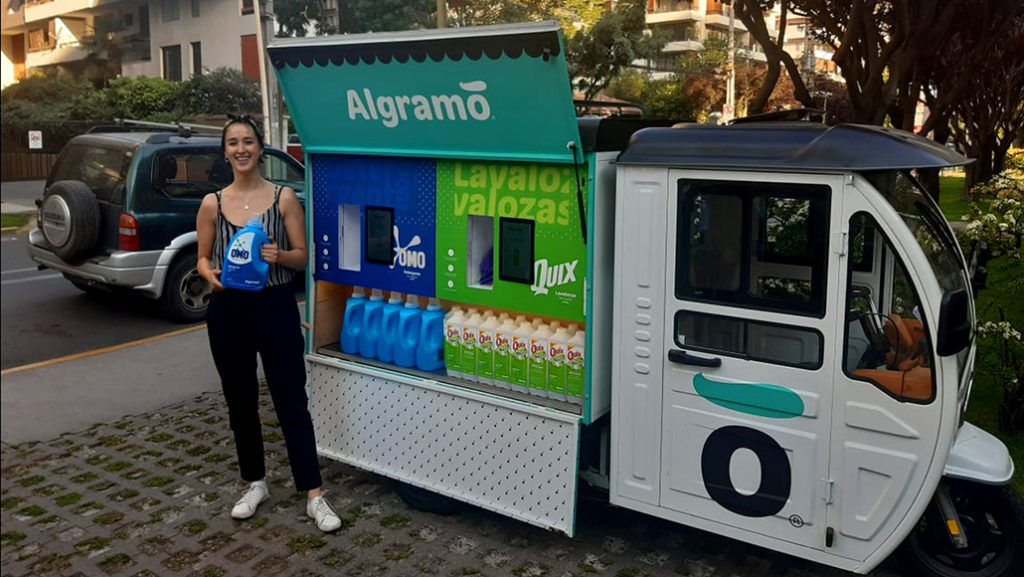
There is no one replacement for the current single-use bag––the solution lies in a combination of approaches that can fit into diverse retail markets. And it’s critical to test these solutions. The nine winners of the Beyond the Bag Challenge––Chicobag, Domtar, EON, Fill it Forward, GOATOTE, PlasticFri, Returnity, SmartC and Sway––need further investment, refining and piloting to help set them up for success, with support from the retail partners who came together to create the Consortium to Reinvent the Retail Bag. We look forward to the exciting work ahead to assess how these solutions can align with customer needs, the growing demand for circular solutions, and the changing face of retail.
Closed Loop Partners joins with CVS Health, Target & Walmart to Announce Winners of “Beyond the Bag” Innovation Challenge
The Consortium to Reinvent the Retail Bag enters next phase: testing and piloting new design solutions to combat plastic waste
NEW YORK, Feb. 16, 2021 /PRNewswire/ — The Center for the Circular Economy at Closed Loop Partners announces the nine winners of the Beyond the Bag Challenge: ChicoBag, Domtar, Eon, Fill it Forward, GOATOTE, PlasticFri, Returnity, SmartC and Sway. The winning solutions fall into three categories: Reuse and Refill; Enabling Technology; and Innovative Materials. Their work ranges from reusable packaging systems, to technology that incentivizes consumers to make the sustainable choice, to bags derived from seaweed or agricultural waste. The winners now enter the next phase of the initiative: working closely with the Consortium to prototype, refine and test the viability of their designs to scale as long-term solutions.
It is estimated that we use 100 billion plastic bags per year in the U.S. alone and less than 10 percent are recycled; the convenience of single-use plastics has had far-reaching consequences for the planet. Single-use plastic bags continue to be one of the top 10 items found along beaches and waterways according to data from Ocean Conservancy’s International Coastal Cleanup. The global threats brought about by climate change and the pandemic have only underscored the urgency of addressing our current system.
The Consortium to Reinvent the Retail Bag is a pre-competitive collaboration committed to reimagining the retail bag and creating a more circular delivery system. Unveiled in July 2020, the Consortium’s Beyond the Bag Initiative is an ambitious three-year undertaking that aims to identify and scale innovative alternatives to the single-use plastic retail bag. Consortium Founding Partners CVS Health, Target and Walmart committed $15 million collectively to the bold collaboration, with the goal of driving transformational change. The Consortium has welcomed additional partners DICK’S Sporting Goods, Dollar General, The Kroger Co., The TJX Companies, Inc., Ahold Delhaize USA Brands, Albertsons Companies, Hy-Vee, Meijer, Wakefern Food Corp., and Walgreens, who have joined in its mission.
“There is no one-size-fits-all solution to tackle a problem as complex as our reliance on single-use plastic bags,” says Kate Daly, Managing Director of the Center for the Circular Economy at Closed Loop Partners. “The diversity of our winners underscores how businesses and consumers alike need to employ a range of solutions to fit different geographic, social and economic contexts. We’re thrilled to announce these companies entering the next phase of the initiative, as we continue to support their growth and begin to implement select pilot programs.”
The Center for the Circular Economy at Closed Loop Partners offers a holistic approach to tackling complex challenges to the circular economy, by operating across every point of the value chain. This enables the Center and its partners to better understand the diversity of needs across multiple sectors, enhance buy-in from key players and identify opportunities. The Center is a place where competitors and peers alike can join for a common purpose.
“It is exciting to see the potential of our efforts to reimagine the single-use bag in action as we unveil these innovative solutions,” says Eileen Howard Boone, Senior Vice President, Corporate Social Responsibility and Philanthropy, CVS Health. “We look forward to exploring opportunities to pilot these solutions at CVS Pharmacy locations.”
The Beyond the Bag Challenge is only the first step. The Center and its partners are committed to a measured, data-driven approach to test and scale viable, long-term solutions that bring value to the entire system.
“We know that tackling this challenge requires a holistic approach to best serve the needs of people, the business, and the planet,” says Amanda Nusz, Senior Vice President of Corporate Responsibility, Target. “We’re excited by the nine winners – together they offer a compelling range of possibilities and inspiring potential solutions to this urgent and necessary work.”
“We’re proud to be part of a collaborative endeavor like the Beyond the Bag Initiative,” says Jane Ewing, Senior Vice President Sustainability, Walmart. “The Beyond the Bag Challenge winners inspire us to reimagine a more sustainable future, showcasing the breadth and tangibility of innovative solutions and we look forward to supporting them in their development.”
The Selection Process
The Beyond the Bag Challenge, in partnership with the global design firm IDEO, sought to identify long-term solutions that reimagine how to get goods home from an in-store purchase, from curbside pick-up, and in-home delivery. Over 450 innovators from around the world submitted their ideas on how to reinvent the retail bag. The Consortium then selected a shortlist of 58 concepts to explore deeper, and ultimately selected a cohort of 9 Winners.
Winners were chosen through a collective process by a panel of 10 subject matter experts alongside the Consortium’s Founding Partners, Sector Lead Partners, Environmental Advisory Partners and the Center for the Circular Economy at Closed Loop Partners. A comprehensive set of criteria addressed three overarching areas:
- People: it must maintain the convenience, efficiency and effectiveness of the single-use plastic bag for customers and retail employees alike. It must take into account accessibility and inclusivity.
- Business: it must have attainable, long-term value for retailers in a variety of environments.
- Planet: it must operate within a circular system and lessen or eliminate environmental and social harm in its sourcing, production, useful life and end-of-life.
These principles are equally important when looking to scale and implement systems that change how we transport items from businesses to home. The Beyond the Bag Initiative thinks outside the box, seeking solutions that align the interests of people, the planet and business.
The Next Phase
Winners will receive a portion of $1 million in prize money and are eligible for additional financial support to support testing, piloting and scaling efforts. Depending upon the type of solution, they will either be invited to join the Circular Accelerator, a mentorship program to further hone and advance their solutions, or begin product testing to improve performance, customer experience and more. The Consortium will work closely with winning solutions throughout 2021, supporting design research, prototyping, mentoring and iterative developments toward piloting select solutions in-market.
About the Center for the Circular Economy at Closed Loop Partners
The Center for the Circular Economy at Closed Loop Partners unites competitors to tackle complex material challenges and to implement systemic change that advances the circular economy. Adept at navigating every step in the value chain, Closed Loop Partners brings together designers, manufacturers, recovery systems operators, trade organizations, municipalities, policymakers and NGOs to create scalable innovations that target big system problems.
The Center’s first initiative, the NextGen Consortium, assembled leading food and beverage companies, including McDonald’s and Starbucks, to identify and commercialize a widely recyclable, compostable and/or reusable cup. 12 winning cup solutions were selected and the Consortium is supporting the testing of these new solutions as well as conducting select pilots to accelerate their path to scale. Learn more about the Center’s work here.
About the Consortium to Reinvent the Retail Bag
The Beyond the Bag Initiative, launched by the Consortium to Reinvent the Retail Bag, aims to identify, pilot and implement viable design solutions and models that more sustainably serve the purpose of the current retail bag. Closed Loop Partners’ Center for the Circular Economy launched the initiative with Founding Partners CVS Health, Target and Walmart. The Kroger Co. joined as Grocery Sector Lead Partner, DICK’S Sporting Goods joined as Sports & Outdoors Sector Lead Partner, Dollar General as Value Sector Lead Partner and TJX as Apparel & Home Goods Sector Lead Partner. Ahold Delhaize USA Brands, Albertsons Companies, Hy-Vee, Meijer, Wakefern Food Corp., and Walgreens are Supporting Partners, and Conservation International and Ocean Conservancy serve as Environmental Advisory Partners. IDEO is the Consortium’s Innovation Partner. Learn more about the Consortium here.
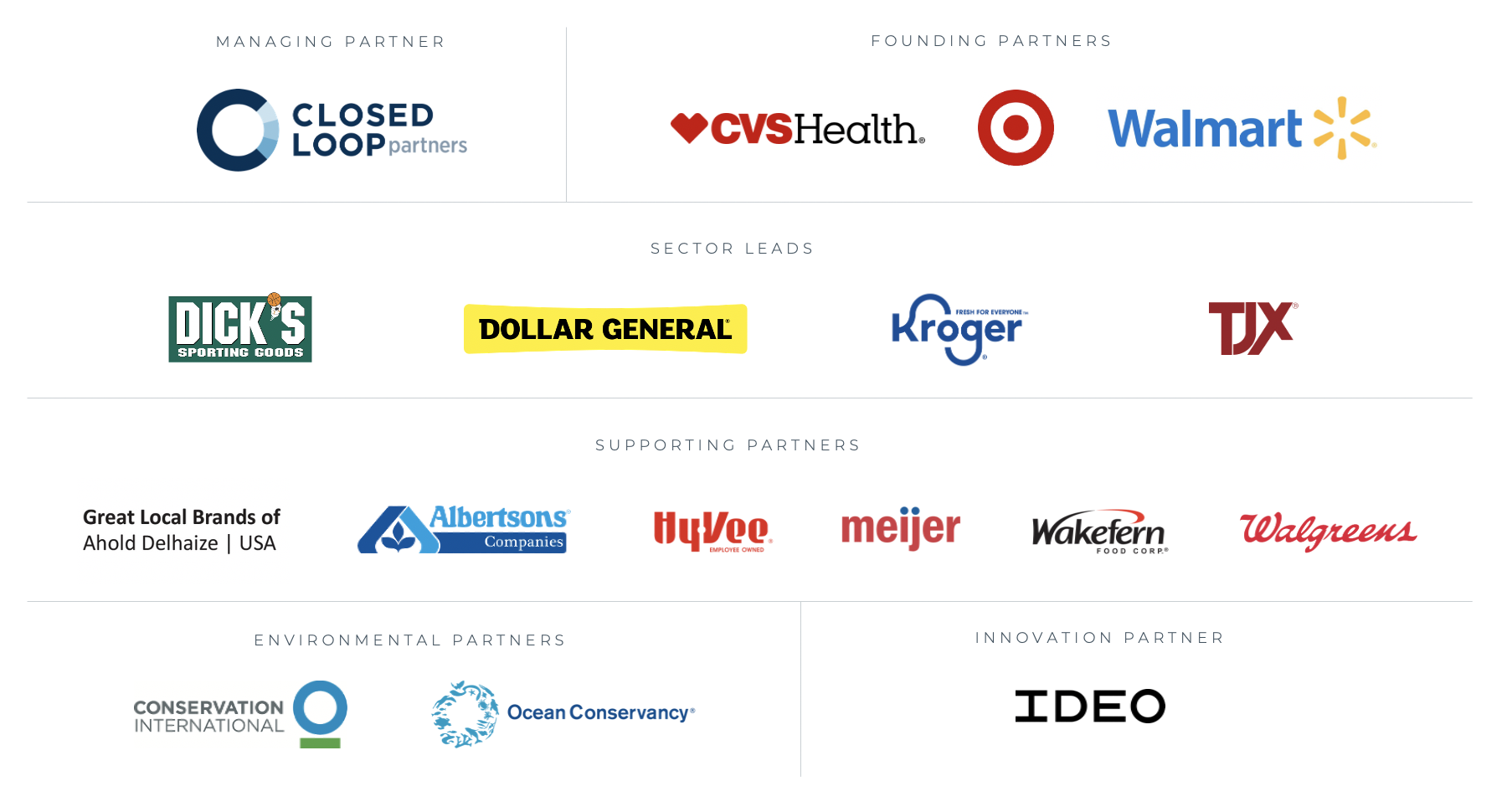
Contact: [email protected]
The TJX Companies Joins Beyond the Bag Initiative
February 13, 2021
TJX has long been committed to pursuing initiatives that are environmentally responsible and smart for our business.
To further its commitment, TJX has joined Closed Loop Partners’ Consortium to Reinvent the Retail Bag, as the Apparel and Home Goods Sector Lead Partner. The Consortium’s Beyond the Bag Initiative convenes leading retailers, aiming to identify, test, and implement viable design solutions and models that more sustainably serve the purpose of the current retail bag. TJX believes that the innovative solutions resulting from this effort could benefit the environment in many ways and could ultimately help enable a solution that uses innovative materials and an efficient collection system and be implemented at a scale that could limit the amount of plastic waste generated from retail point-of-sale bags, and associated harmful chemicals, from entering the environment.
“We are thrilled to welcome TJX as the Apparel and Home Goods Sector Lead Partner for the Consortium to Reinvent the Retail Bag, further expanding the Consortium’s potential for impact,” says Kate Daly, Managing Director of the Center for the Circular Economy at Closed Loop Partners. “The plastic bag is used across diverse contexts and in joining our efforts, TJX is demonstrating its efforts to reduce plastic waste.”
Wakefern Next to Venture ‘Beyond the Bag’
February 12, 2021
Wakefern Food Corp. has become the latest grocer to join the Consortium to Reinvent the Retail Bag and its Beyond the Bag Initiative, a collective effort with the goal of identifying, testing and scaling design solutions to create a more sustainable retail bag.
“For more than four decades, the Wakefern cooperative has supported sustainability through efforts such as recycling plastic bags and other materials, reducing food waste, and implementing energy-efficient technology at retail and in our distribution centers,” said Karen Meleta, Wakefern’s chief communications officer. “Encouraging our customers to use reusable bags to shop and reducing dependency on single-use plastic and traditional paper bags is another important part of our commitment to the environment. We believe the best bag is a reusable bag, and we are proud to work with fellow consortium partners and innovators to create an even better retail bag and further advance our waste reduction initiatives.”
Launched in 2020, Beyond the Bag is a three-year effort to create sustainable and cost-effective retail bag solutions. The initiative unites major retailers as consortium partners, among them founding partners CVS Health, Target and Walmart, alongside other partners Dick’s Sporting Goods, Dollar General, Kroger, Albertsons Cos., Hy-Vee, Meijer and Walgreens. The consortium also works with such stakeholders as suppliers, materials recovery facilities, municipalities and advocacy groups to collectively identify viable market solutions that can scale and bring value to retailers, customers and end markets. Taking a holistic approach to identify and scale affordable, accessible and less wasteful retail bag alternatives, Beyond the Bag spans various complementary workstreams, driving innovation, advancing materials recovery through infrastructure investments, and seeking best practices for policy and engaging consumers.
Wakefern’s supermarket banners already offer a range of reusable bags.
“Wakefern’s connection to the communities its stores serve, and its alignment with the consortium’s broader vision, lays the essential foundation for meaningful impact at scale,” said Kate Daly, managing director of the Center for the Circular Economy at New York-based investment firm Closed Loop Partners, which launched the consortium. “We are thrilled to welcome Wakefern Food Corp. to the consortium to help build more pathways for collaboration that will create and incentivize sustainable, long-term change for retail.”
The largest retailer-owned cooperative in the United States, Keasbey, New Jersey-based Wakefern Food Corp. comprises 50-plus members that independently own and operate more than 350 supermarkets under the ShopRite, The Fresh Grocer, Price Rite Marketplace, Gourmet Garage and Dearborn Market banners in New Jersey, New York, Connecticut, Pennsylvania, Maryland, Delaware, Massachusetts, Rhode Island and New Hampshire. The company is No. 25 on The PG100, Progressive Grocer’s2020 listing of North America’s top retailers of food and consumables. Walmart, Kroger, Walgreens, CVS Health, Target, Albertsons, Dollar General, Meijer and Hy-Vee are Nos. 1,3, 4, 6, 7, 8, 16, 19 and 33, respectively, on PG’s list.
Originally published in Progressive Grocer
HomeBiogas Announces USD 94 Million Initial Public Offering, Expanding Global Clean Energy Solutions from Organic Waste
February 11, 2021
The company is poised to expand its household and community-size anaerobic digester systems into additional markets in North America and beyond, offering modular, affordable and local solutions to create value from organic waste on site
February 11 – HomeBiogas, an Israel-based company developing biogas systems that convert organic materials into renewable energy and fertilizer, successfully completed its initial public offering (IPO) in Israel, with a valuation of NIS 310 million after money, or approximately USD 94 million. The IPO was oversubscribed and HomeBiogas chose to raise approximately NIS 100 million which was received from the largest and leading institutional investors in the market, including provident funds, insurance companies and pension funds. Monday, February 1, was its first day trading.
HomeBiogas’ IPO reflects the growth in demand for more sustainable and local solutions, solving two major challenges: waste management and clean energy. Their household and community-size anaerobic digesters transform organic waste into clean energy and liquid fertilizer, saving on waste removal and energy costs. HomeBiogas also recently launched their BioToilet, offering a sanitation solution for communities without sewer infrastructure. Today, the company leads the establishment of an international standard for household biogas systems, holding international patents and European CE certificate, with stringent standards and safety requirements.
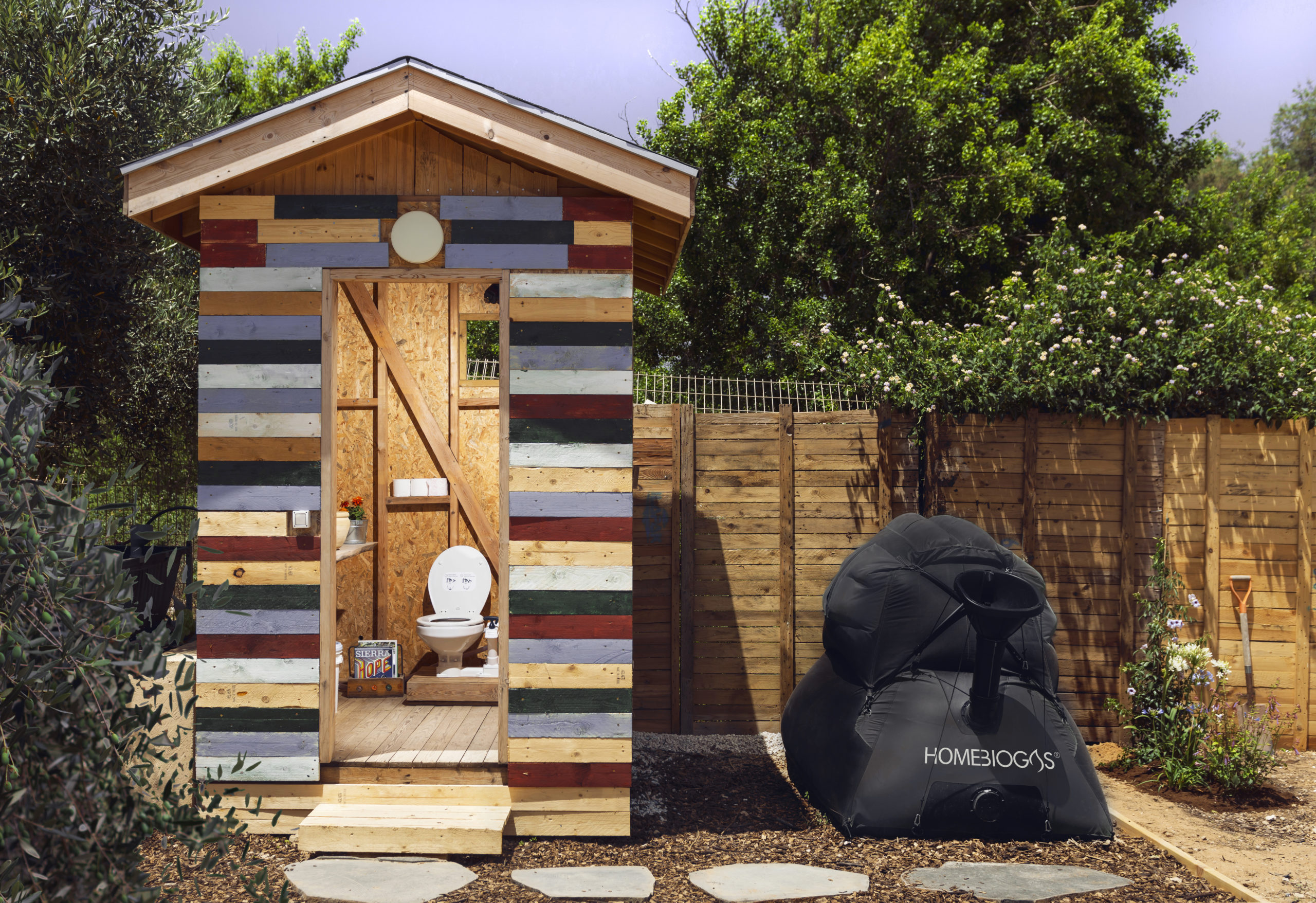
The continued growth of HomeBiogas comes at a critical time, in the midst of COVID-19 stay-at-home mandates that have shifted consumer habits and demands toward local alternatives that rely less on complex, often opaque global supply chains. With food waste continuing to mount around the world––worth roughly USD 680 billion in industrialized countries and USD 310 billion in developing countries––solutions that mitigate the loss of these valuable resources have become essential.
Since its founding, HomeBiogas has experienced consistent and extensive growth, selling over 10,000 systems in more than 100 countries in recent years. In the developing world, more than 3 billion people still use wood and charcoal for cooking, while 2.5 billion do not have access to toilets. HomeBiogas’ systems can transform their lives, creating a local closed loop system that generates value for years to come.
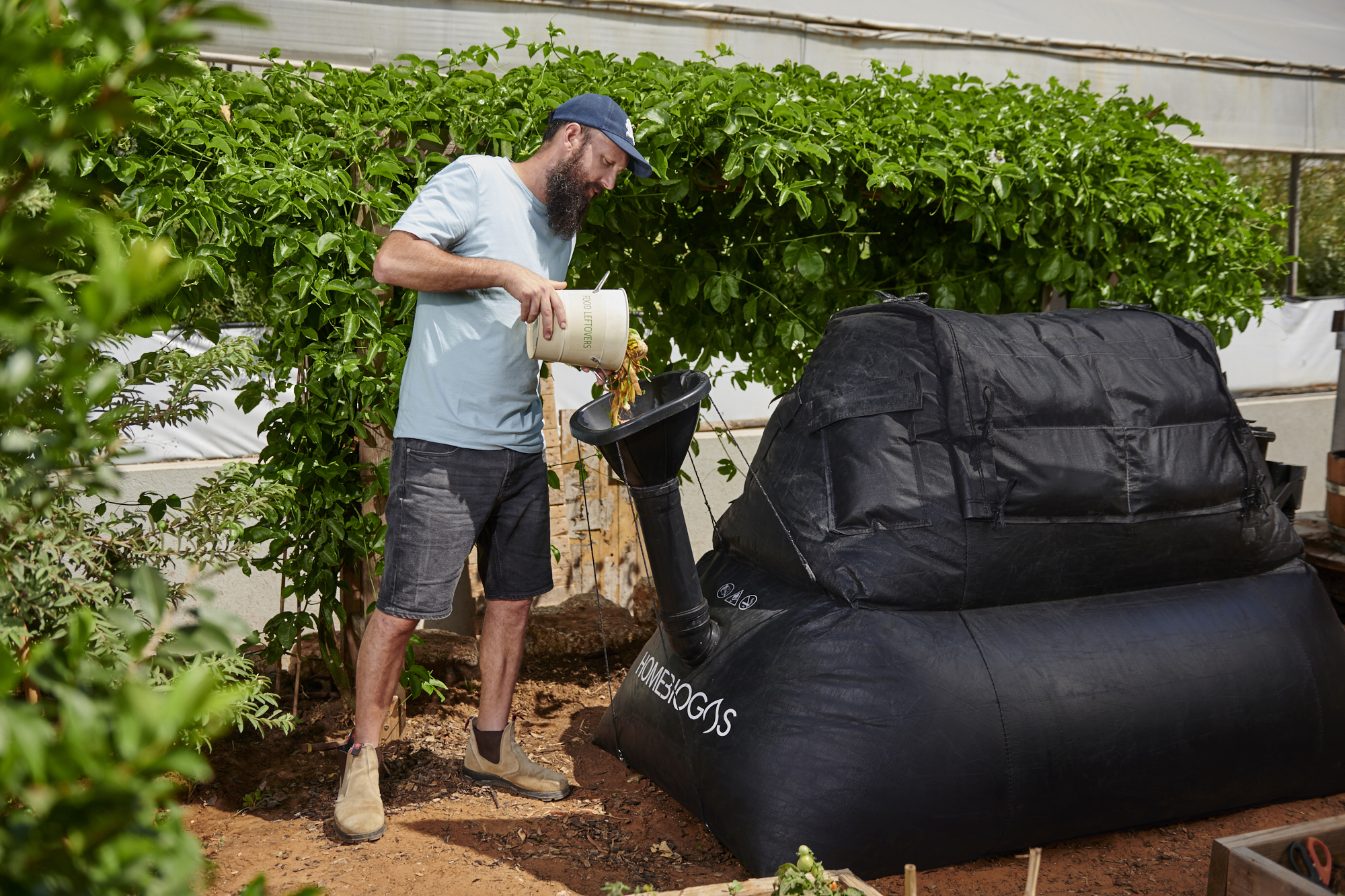
The recent IPO will accelerate HomeBiogas’ growth into additional markets, including North America, helping expand the solution at a larger scale into commercial operations in restaurants, hotels, universities, hospitals and others, generating significant savings in costs of organic waste removal, energy savings and a significant reduction in carbon footprint. Through the IPO, HomeBiogas also plans to increase production and sales in selected countries, through partnerships with local distributors. HomeBiogas’ founders Oshik Efrati (CEO), Erez Lantzer (CFO) and Yair Teller (CSO), continue to be engaged in the development, production and marketing of biogas systems for household and commercial markets. Leading circular economy investor Closed Loop Partners, global energy firm Engie and family office JS Capital are also major shareholders in HomeBiogas.
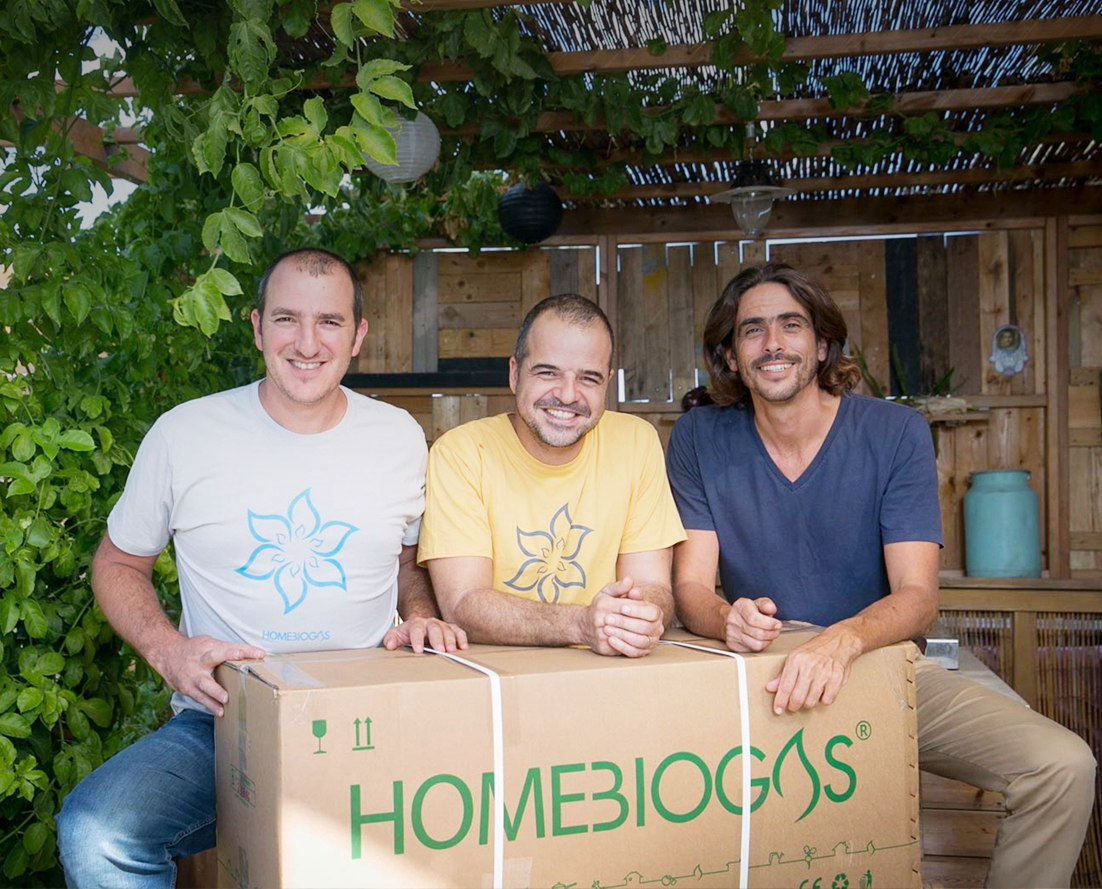 “HomeBiogas’ IPO is a market signal for the growth of local systems that circulate valuable resources, especially food and energy. By expanding its reach across the globe, HomeBiogas can create positive economic, social and environmental outcomes at scale, while maintaining deep roots in the local communities it serves,” says Ron Gonen, CEO of Closed Loop Partners. “We are proud to be a founding and longstanding investor in the company and continue to work closely with their team, and look forward to seeing the essential role HomeBiogas will play in advancing the circular economy.”
“HomeBiogas’ IPO is a market signal for the growth of local systems that circulate valuable resources, especially food and energy. By expanding its reach across the globe, HomeBiogas can create positive economic, social and environmental outcomes at scale, while maintaining deep roots in the local communities it serves,” says Ron Gonen, CEO of Closed Loop Partners. “We are proud to be a founding and longstanding investor in the company and continue to work closely with their team, and look forward to seeing the essential role HomeBiogas will play in advancing the circular economy.”
“This major step for HomeBiogas is also a milestone in the decentralized biogas from organic waste sector,” says Johann Boukhors, Managing Director of Engie New Ventures. “By maximizing the potential of local organic material in creating useful renewable energy for multiple types of customers, HomeBiogas bolsters the local infrastructure needed to participate in a more sustainable future built on clean, affordable, resilient energy.”
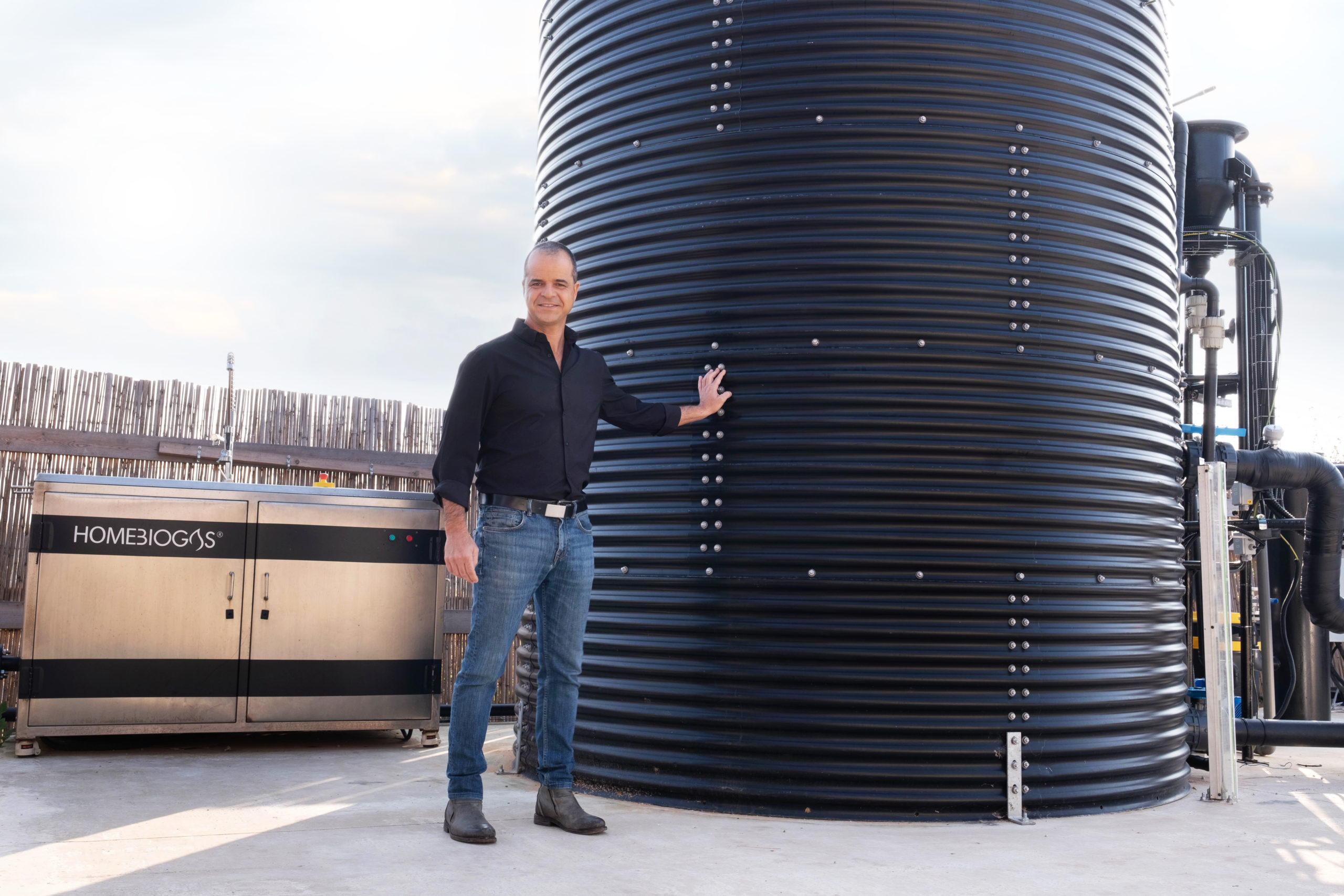
“The trust we received from the Israeli capital market, together with the rising demand for biogas systems in the world, proves how relevant and necessary our product is. Its growth rate and production efficiency allow us to deepen our entry into our target markets and increase the sales potential,” says Oshik Efrati, Founder and CEO of HomeBiogas. “I believe that the ability for any person or organization to produce energy from leftover organic waste is not far. This will reduce our dependence on fossil energy, as well as the environmental pollution and greenhouse gases resulting from the transportation and landfilling of waste. Countries and organizations are rapidly moving in this direction, both in legislation and investments. Combining our technology and knowledge with our powerful shareholders will allow us to be a leading player in the field.”
About HomeBiogas
HomeBiogas is a world leader in developing groundbreaking, simple to use biogas systems. Enabling people and businesses around the globe to turn their own organic waste into self-made clean energy, on-site. Since 2012, HomeBiogas has served thousands of households, farmers, businesses, underserved communities,and those seeking a more sustainable way of living with over 10,000 biogas systems in over 100 countries around the world. Our prefabricated, fully off-grid, patent-based systems offer modular options to suit each of our customer ‘s needs, empowering them to live a healthier, more efficient, self-resilient, and sustainable life.
About Closed Loop Partners
Closed Loop Partners is a New York-based investment firm comprised of venture capital, growth equity, private equity and project finance, as well as an innovation center focused on building the circular economy. The firm has built an ecosystem that connects entrepreneurs, industry experts, global consumer goods and technology companies, retailers, foundations, financial institutions and municipalities. Their investments align capitalism with positive social and environmental impact by reducing waste and greenhouse gas emissions via materials innovation, advanced recycling technologies, supply chain optimization and diversion of materials from landfills. Learn more at www.closedlooppartners.com.
About ENGIE New Ventures
ENGIE New Ventures (ENV) is the corporate venture arm of ENGIE, the global energy and services provider. ENGIE is committed to lead the energy revolution, towards a more decarbonized, decentralized and digitized world. ENV is a €180 million investment fund focused on making minority investments in innovative start-ups. Since 2014, ENV has deployed over €140 million of capital across 26 investments, in disruptive start-ups leading the energy transition and active in energy efficiency, renewable energy, energy storage and demand response, mobility and IoT. ENV’s offices are represented in Paris, San Francisco, Singapore and Tel Aviv. Please visit: www.engieventures.com.
Dollar General Joins the Beyond the Bag Initiative as Value Sector Lead Partner
February 04, 2021
DG’s 17,000+ stores to serve as key partner in exploring more sustainable solutions to reinvent the retail bag
GOODLETTSVILLE, Tenn.–(BUSINESS WIRE)–Dollar General (NYSE: DG) announced today its commitment to join the Consortium to Reinvent the Retail Bag as its Value Sector Lead Partner. The Consortium, through its Beyond the Bag Initiative, aims to identify, test and implement viable design solutions that can more sustainably serve the purpose of the current plastic retail bag.
The Center for the Circular Economy at Closed Loop Partners launched the initiative to replace the current retail bag in July 2020 and currently has multiple work streams to spur innovation, identify best practices for policy and engage consumers. Recently, the Consortium announced 58 shortlisted solutions from the Beyond the Bag Challenge, selected from 450+ submissions from more than 60 countries. Challenge winners will be announced soon.
As a Sector Lead Partner, Dollar General will direct priorities and activities for the Beyond the Bag Initiative in the context of the value sector of retail. DG and its more than 17,000 stores across 46 states will explore viable solutions resulting from the Beyond the Bag Challenge and recommend ways in which these solutions can align with the operations of existing stores and customer needs.
“Dollar General’s desire to be good stewards of our communities while reducing our environmental impact through sustainable and business-friendly practices inherently aligns with the Consortium’s vision for a more sustainable retail industry,” says Steve Sunderland, Dollar General’s executive vice president of store operations. “We understand industry-wide changes and innovative approaches need to be considered, and we look forward to working with Closed Loop Partners and the winning solutions to explore viable alternatives to the current retail bag.”
“We are delighted to welcome Dollar General to the Consortium to Reinvent the Retail Bag, joining our Founding Partners CVS Health, Target and Walmart, alongside other leading retailers to pave the way forward for a more sustainable future for retail,” says Kate Daly, Managing Director of the Center for the Circular Economy at Closed Loop Partners. “As an innovator in the sector, Dollar General’s commitment is critical to making circular solutions more widely available, while addressing the challenges of the single-use bag.”
Approximately 100 billion single-use plastic bags, typically made of non-renewable fossil fuels, are used in the U.S. annually, and less than 10% of these are recycled. These bags have also become among the top 10 items found on beaches and waterways around the world, impacting the planet, people and businesses. To learn more about the Consortium to Reinvent the Retail Bag, visit www.beyondthebaginitiative.com.
About Dollar General Corporation
Dollar General Corporation has been delivering value to shoppers for more than 80 years through its mission of Serving Others. Dollar General helps shoppers Save time. Save money. Every day!® by offering products that are frequently used and replenished, such as food, snacks, health and beauty aids, cleaning supplies, basic apparel, housewares and seasonal items at everyday low prices in convenient neighborhood locations. Dollar General operated 16,979 stores in 46 states as of October 30, 2020. In addition to high-quality private brands, Dollar General sells products from America’s most-trusted manufacturers such as Clorox, Energizer, Procter & Gamble, Hanes, Coca-Cola, Mars, Unilever, Nestle, Kimberly-Clark, Kellogg’s, General Mills, and PepsiCo. Learn more about Dollar General at www.dollargeneral.com.
About the Consortium to Reinvent the Retail Bag
The Beyond the Bag Initiative, launched by the Consortium to Reinvent the Retail Bag, aims to identify, pilot and implement viable design solutions and models that more sustainably serve the purpose of the current retail bag. Closed Loop Partners’ Center for the Circular Economy launched the initiative with Founding Partners CVS Health, Target and Walmart. Kroger joined as Grocery Sector Lead Partner, DICK’S Sporting Goods as Sports & Outdoors Sector Lead Partner, Dollar General as Value Sector Lead Partner, and Albertsons Companies, Hy-Vee, Meijer, and Walgreens as Supporting Partners, alongside Conservation International and Ocean Conservancy as Environmental Advisory Partners. OpenIDEO is the Consortium’s Innovation Partner. Learn more about the Consortium here.
Contacts
Crystal Ghassemi
Media Hotline: 1-877-944-DGPR (3477)
[email protected]
Meal Kits Are Growing But Need Smarter Packaging For a Sustainable Future
February 02, 2021
TemperPack manufactures sustainable, high performance packaging for cold chain shipments. The company’s ClimaCell® thermal liners are used by leading meal kit brands and other companies that ship fresh and frozen food and temperature sensitive medical treatments to people’s homes. TemperPack manufactures millions of liners per month from its facilities in Richmond, VA and Las Vegas. James McGoff is TemperPack’s co-founder and Chief Product Officer.
Over the last decade, e-commerce changed the world. Over the last year, COVID-19 has changed e-commerce.
The biggest change? Ordering groceries online is now normal for many Americans. Food had been the last frontier for e-commerce, due to the challenges of maintaining refrigerated or frozen temperatures for a 1 to 2-day shipment. But a Mercatus study predicts 20% of all food shopping will happen online by 2025, to the tune of a $250bn annual spend.
How did we get here, and where are we going? At TemperPack, we make it our job to understand the science and business of perishable shipments.
As a first step, let’s go back in time.
MEAL KITS ARE BORN
HelloFresh and Blue Apron were founded in 2010 and 2011, each with a vision for changing the way we eat.
That new way involved shipping fresh produce and meat to people’s homes via the mail. Though early pioneers in the mail order food game had shipped frozen food (Omaha Steaks and Jenny Craig), meal kit companies were the first to really take on the challenge of shipping fresh food (i.e., keeping lettuce crisp for a 2-day UPS shipment). Thanks to their logistical prowess, they made it work.
Meal kit companies attracted significant investment around the vision of reinventing a food system compatible with an e-commerce world. That vision got an additional boost when Amazon acquired Whole Foods in 2017, prompting traditional grocers to offer “click and collect” services and helping accelerate the adoption of perishable e-commerce.
Today, you can get meat, produce, ice cream, frozen dinners, fresh prepared meals, meal kits, diet-specific meals, restaurant take-out, and pantry items delivered to your home. If you want, you don’t ever have to step foot into a grocery store again or leave your house for that matter.

MEAL KITS: A SURPRISING BOOST FOR THE ENVIRONMENT
While people might worry about the environmental impact of packaging up and shipping meals to people’s houses via FedEx and UPS, meal kits offer significant environmental benefits compared to shopping at grocery stores: reducing food waste and reducing CO2 emissions.
According to Feeding America, 120 billion pounds of food is wasted each year, at farms, businesses (such as grocery stores and restaurants), and at homes. 21% of landfill space is occupied by food.
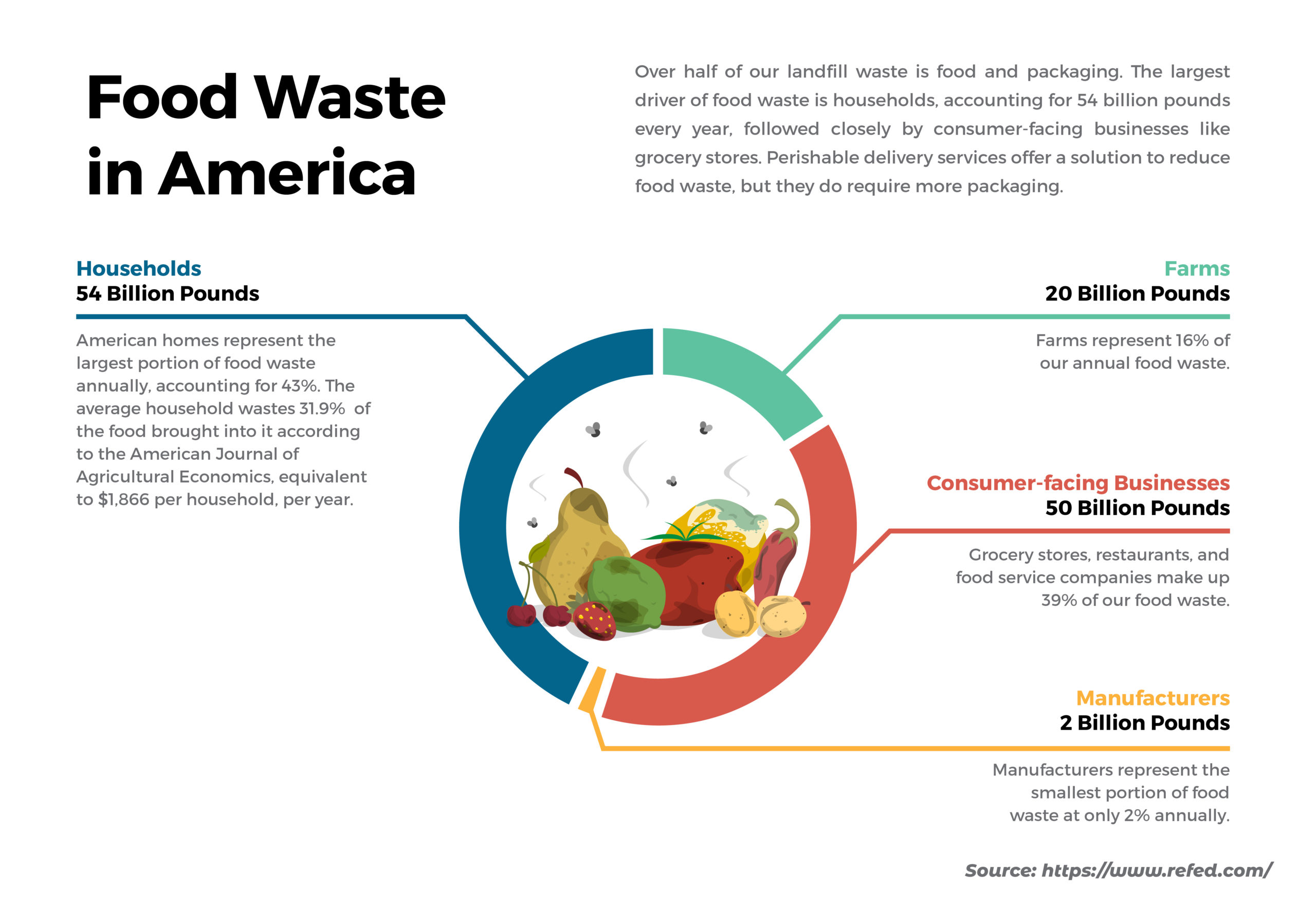
The biggest sources of food waste are consumers in their homes, accounting for 54 billion pounds of all wasted food. Meal kits reduce food waste at home by portioning meals and providing only what is needed for each recipe.
Businesses that sell food are another significant source of waste. 52 billion pounds of food from manufacturers, grocery stores, and restaurants end up in landfills. From a food waste perspective, meal kits and other direct-to-consumer food companies use a more efficient business model than retail. While a meal kit packing facility is designed for efficiency, a grocery store is designed to showcase abundance, whether that means mountains of alluring produce or soft drinks as far as the eye can see. Even with admirable efforts from companies like Kroger, this model is designed to generate more waste when it comes to perishable items.
With built-in features that reduce food waste both at home and in upstream distribution, meal kit companies can make a big impact. HelloFresh estimates that it reduced food waste by 66% compared to grocery stores in 2019. Other direct-to-consumer food companies like Misfits Market and Imperfect Foods can go even further by offering their customers “rescued” off-spec food that was likely headed for a landfill.
Food waste contributes to carbon emissions, and the reduced food waste of meal kits helps reduce their carbon footprint. A study by the University of Michigan estimates that meal kits reduce carbon emissions by 33% compared to grocery store meals.
While the negative aspects of meal kits (delivery trucks and packaging) are on stage for all to see, behind the scenes, meal kits operations have a net positive benefit compared to shopping at grocery stores.
PACKAGING: THE 2:1 DILEMMA FOR MEAL KITS
But what about that packaging? Let’s take a closer look. We work with many meal kit and direct-to-consumer food companies and are familiar with their overall model and operations.
While specific companies and specific meal orders vary significantly, a typical meal kit order weighs about 20 pounds (averaging across 10 of the largest meal-kit companies in the United States). Of that weight, approximately 35% represents the actual food in the box, 45% makes up the coolant in the form of gel packs or ice, and the 20% is physical packaging:
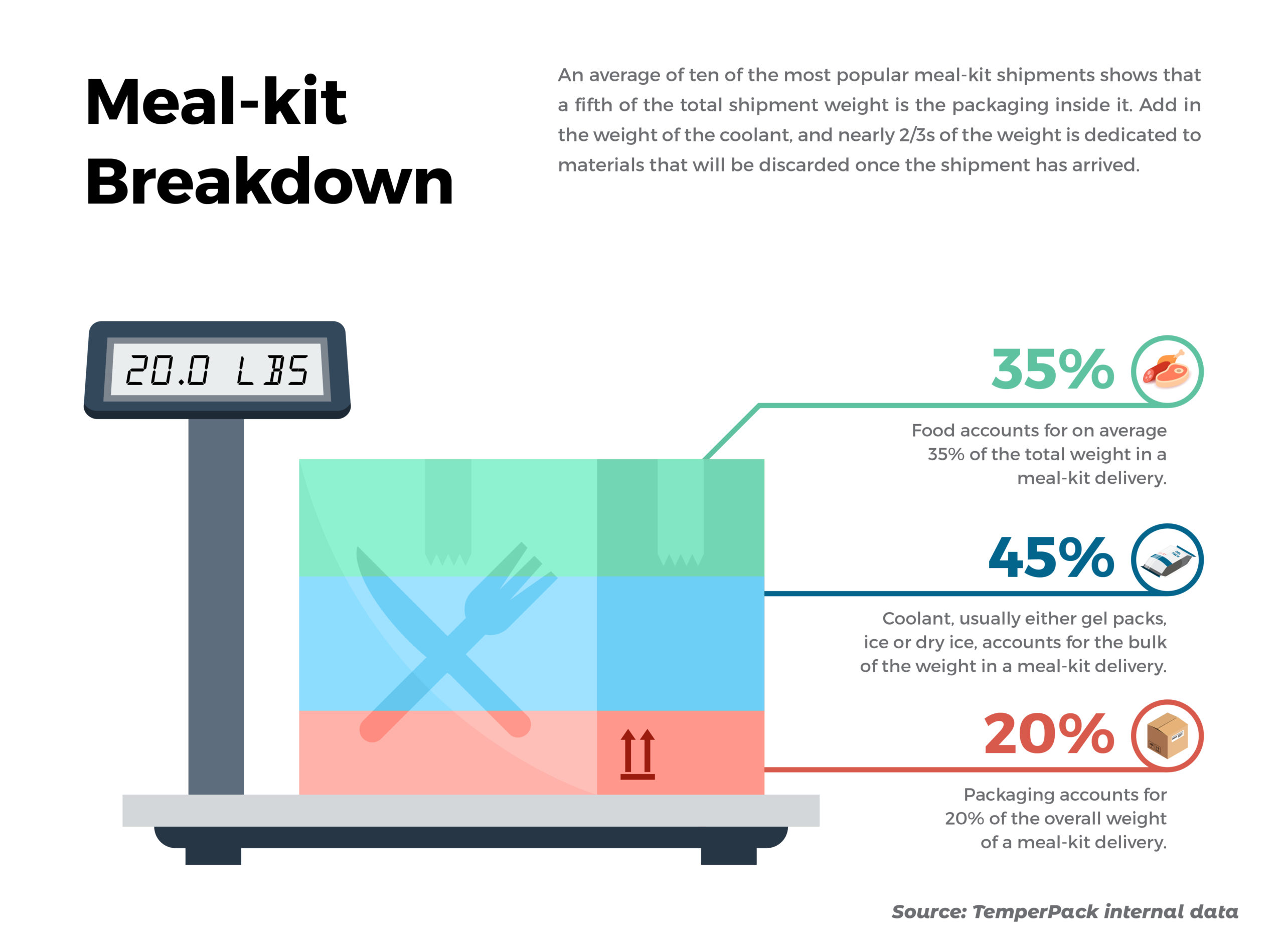
That’s almost twice as much packaging material as food. And the numbers add up. Based on our own data and external sources, we estimated that 120 million meal kit shipments would be delivered in the US in 2020. This means over 1.5 billion pounds of packaging and coolant will be used to protect 840 million pounds of food.

A reasonable question to ask is: how is it possibly sustainable to use 1.5 billion pounds of packaging to protect 840 million pounds of food? Sustainability aside, are meal kit companies adding risk to their business by asking their own customers to manage 1.5 billion pounds of inbound packaging waste?
By our estimates, meal kit deliveries will increase 30-50% next year (and all the packaging that comes with it), so these are increasingly pressing questions.
MEAL KIT PACKAGING – A CLOSER LOOK
With the industry generating [nearly a billion] pounds of packaging waste, it’s important to understand what’s in there. Packaging and coolant represent approximately 2/3s of the overall weight of the shipment.
Here’s a breakdown:
Outer shipping box – Most companies use familiar corrugated boxes – aka the cardboard boxes Amazon uses. The EPA states that these corrugated boxes are recycled correctly 88% of the time, more often than any other material. Most companies we work with use boxes from Sustainable Forestry Initiative certified sources.
Insulation – In short, insulation makes it difficult for ambient heat to enter the box. So even when it’s hot outside, the contents inside stay cold. If meal kit companies were driven purely by performance and cost, they would all use Expanded Polystyrene Foam (EPS), better known as Styrofoam®. EPS is inexpensive and effective, but its environmental hazards are well known. To their credit, very few meal kit companies use EPS. Most of them have moved on to more environmentally friendly materials, including repurposed natural textile fibers (like denim and cotton), paper, or bio-foams. However, often these insulation liners contain plastic binders and still need to go to a landfill, but some, including our ClimaCell® liners, are curbside recyclable.
Ice Packs – Ah, ice packs. As noted above, the ice packs (often referred to as gel-packs or “coolant”) are the heaviest item in a container. Most coolants include a mixture of water and ethylene glycol (which is what gives it a “jelly” feel) and are wrapped in low density polyethylene (LDPE), the same material used in plastic shopping bags.
In short, the coolant is what absorbs the heat that does make it past the insulation. In theory, if you had a perfect insulator, you wouldn’t need coolant. Conversely, if you were to use enough coolant, you wouldn’t need the insulation. Combining the two is the best way to minimize overall packaging while protecting the shipment.
Individual Wraps and Containers – To protect individual items from moisture, and keep the box organized, meal kits used pouches, wraps, or light containers to protect specific items. Often these use LDPE or PET.
Flyers, promotions, menu cards – There are many pieces of paper, but most of these are recyclable from home, though some are not due to the plastic lamination needed for that high gloss, premium look and feel.
MAKING MEAL KITS BETTER FOR THE PEOPLE, BUSINESS, and the PLANET
The most sustainable packaging is no packaging. Being that this is incompatible with the challenges of delivering perishables through the mail, what would smarter packaging look like? For starters, we would suggest a strategy that minimizes non-recyclable plastics like low density polyethylene (LDPE) film. LDPE film widely used in meal kit packaging, especially for individual wraps, insulation lining, and coolant bags. Removing this would not only have an environmental benefit, but a brand benefit as well, since 77% of consumers consider plastic to be the least sustainable packaging material.
LDPE is not recyclable at home, and a GreenPeace study suggests that, even when people take it to collection sites (often grocery stores), it usually ends up in a landfill. There are few paths to reduce LDPE.
- Short-term: Add Rigidity. Switching out flexible LDPE for more rigid High-Density Polyethylene (HDPE) or Polyethylene terephthalate (PET) would replace an unrecyclable material for one that is recyclable from home. HDPE is used in milk jugs and detergent bottles while PET is commonly used for single use water bottles and produce containers. Both are highly recyclable when they are rigid. We can envision replacing individual ingredients wrapped in LDPE with fewer, rigid containers protecting groups of ingredients.
- Long-term: Compostable Innovations. There are many companies working to develop paper-based, compostable and/or dissolvable (and even edible) films for food protection. The Ellen MacArthur Foundation’s “Upstream Innovation Guide” featured several, including Apeel, Monosol, and Mori. While still not as commercially available as their traditional film counterparts, these solutions would be far more environmentally friendly – a big improvement for meal kit solutions and fresh food everywhere.
Coolants are a big part of the equation as well. While the most commonly used gel packs today must be thrown away, innovation continues around drain-safe coolants (in which most of the gel pack material can be safely poured down the drain), dry ice solutions, and more. Again, coupling a rigid, highly recyclable plastic container with a drain-safe coolant (like water, which has a very high energy density) would be a step in the right direction.
Stepping Back
Meal kit companies have narrow margins and fluctuating subscription bases, so expecting these companies to spend more money on more sustainable solutions may be a stretch. But we can envision a future where materials and operations are optimized so that only the right amount of packaging, insulation, and coolant are used for each specific shipment, based on the weather, duration, and payload, saving companies money and reducing the amount of trash customers must manage.
The management teams running these companies have already proven that they can find solutions to complex supply chain issues. To solve their packaging challenge, we would recommend that these teams consider the five following strategies:
- Standardize acceptable food safety criteria (time and temp) across all grocery delivery modes and products.
- Design packaging scenarios with sufficient safety factors to account for contact-free, unattended delivery scenarios.
- Implement real-time weather data to inform geographical and seasonal packaging decisions, reducing refunds while mitigating risk of food-borne illness.
- Using 2 & 3, transition to dynamic pack-outs so that each box goes out with the minimum viable amount of packaging to safely get the job done – driving out cost.
- Where packaging is necessary, commit to packaging formats that utilize renewable materials that are first, and ideally, compatible with curbside paper and plastic recycling streams, or second, BPI-certified for compost.
Achieving this “right materials at the right time” approach would boost these companies’ bottom lines and further improve their carbon footprints. Getting there is within reach and would allow food delivery companies to trumpet a persuasive argument that their model is truly best for the environment. Sign us up.
Albertsons Companies Joins Beyond the Bag Initiative
January 25, 2021
Goals include reducing use of virgin materials, scaling new solutions, diverting bags from landfills; efforts complement plastic reduction work already underway at Albertsons Cos.
BOISE, Idaho–(BUSINESS WIRE)–Albertsons Companies today announced that it has joined the Beyond the Bag Initiative, its latest step to contributing to efforts to reduce plastic waste.
The Beyond the Bag Initiative, launched by the Consortium to Reinvent the Retail Bag, is a multi-year collaboration across retail sectors that aims to identify, test, and implement innovative new design solutions that serve the function of today’s single-use plastic retail bag, delivering ease and convenience for consumers while striving to lessen the impact on the environment.
“Albertsons Cos. has a passion for innovation and shares Beyond the Bag’s vision of reinventing the single-use retail bag,” said Suzanne Long, Group Vice President of Strategic Sourcing & ESG. “Ensuring our products are better for our communities and the planet is a priority for us. We look forward to working with the Beyond the Bag Initiative to help create a more sustainable future.”
The Beyond the Bag Initiative has several foundational goals:
- Reduce the use of virgin materials from natural resources and greenhouse gases emitted from the production and recovery of bag solutions
- Identify and scale innovative new design solutions to create a system that serves the function of the current retail bag
- Increase the percentage of retail bags diverted from landfills
- Inspire and engage people to imagine new possibilities for the retail bag system
Convened by The Center for the Circular Economy at Closed Loop Partners, the Consortium includes retailers, environmental advisory partners, and third-party experts. Last summer, the Consortium launched a global innovation challenge to identify solutions to replace the current plastic bag, inviting entrepreneurs, designers, suppliers, and problem-solver to submit solutions. The Consortium expects to announce winning concepts in February. Eligible winners will receive funding, assistance in scaling, and get access to testing and potential piloting opportunities.
“It’s time for us to think beyond the status quo and reinvent the ubiquitous retail bag for a more sustainable future,” says Kate Daly, Managing Director of the Center for the Circular Economy at Closed Loop Partners. “We’re thrilled to welcome Albertsons Cos. into this consortium of leading retailers. Together, we can create impact at scale and tackle the challenge of plastic bag waste that spans companies and sectors.”
Throughout the next few years, Albertsons Cos. will continue to work on its own initiatives as well as collaborate with Consortium Partners to provide solutions for how to transport groceries home in a way that is both convenient for customers and more sustainable for the environment. The Consortium includes the three Founding Partners CVS Health, Target, and Walmart, as well as Kroger, DICK’s Sporting Goods, Hy-Vee, Meijer and Walgreens.
More information about the Beyond the Bag Initiative and its retail partners can be found here.
Additional plastic reduction efforts already underway at Albertsons Cos:
- Plastics and Packaging Pledge: Albertsons Cos. announced its Plastics and Packaging Pledge in April 2019 to advance sustainability and reduce plastic waste throughout the company and its banners, starting with its operations and its extensive Own Brands portfolio. Among the commitments is a pledge to ensure 100 percent of its Own Brands packaging is recyclable, reusable, or industrially compostable by 2025. The company has also committed to decreasing its overall plastic usage, with an emphasis on single-use plastics. More information about the company’s Plastics and Packaging Pledge can be found at www.albertsons.com/plasticspledge.
- Reusable bags made with recycled bags and plastic film: Select stores offer reusable shopping bags that are produced through a closed-loop process that produces bags made from 65 percent recycled material, including a minimum of 40 percent post-consumer waste. Some of this recycled material comes from plastics that customers recycle in the stores and the company’s own operations.
- Reusable bags made from ocean-bound plastic: The company’s Southern California stores offer bags made with up to 90 percent post-consumer plastics that would otherwise end up in oceans and waterways. Each bag is created from material that has been traced through the entire supply chain – from collection to production.
- Efforts to reduce single-use bags: The company is proactively working to decrease double-bagging and increasing the number of items in each bag while still protecting the groceries inside the bag. The plastic bags come with a printed reminder to reminder to recycle bags; many stores offer drop-off bins for single-use plastic bins to help customers recycle their bags.
About Albertsons Companies
Albertsons Companies is a leading food and drug retailer in the United States. The company operates stores across 34 states and the District of Columbia under 20 well-known banners including Albertsons, Safeway, Vons, Jewel-Osco, Shaw’s, Acme, Tom Thumb, Randalls, United Supermarkets, Pavilions, Star Market, Haggen and Carrs. Albertsons Cos. is committed to helping people across the country live better lives by making a meaningful difference, neighborhood by neighborhood. In 2019 alone, along with the Albertsons Companies Foundation, the company gave $225 million in food and financial support. In 2020, Albertsons Cos. made a $53 million commitment to community hunger relief efforts and a $5 million commitment to organizations supporting social justice. These efforts have helped millions of people in the areas of hunger relief, education, cancer research and treatment, social justice and programs for people with disabilities and veterans’ outreach.
About the Consortium to Reinvent the Retail Bag
The Beyond the Bag Initiative, launched by the Consortium to Reinvent the Retail Bag, aims to identify, pilot and implement viable design solutions and models that more sustainably serve the purpose of the current retail bag. Closed Loop Partners’ Center for the Circular Economy launched the initiative with Founding Partners CVS Health, Target and Walmart. Kroger joined as Grocery Sector Lead Partner, DICK’S Sporting Goods as Sports & Outdoors Sector Lead Partner and Albertsons Companies, Hy-Vee, Meijer, and Walgreens as Supporting Partners, alongside Conservation International and Ocean Conservancy as Environmental Advisory Partners. OpenIDEO is the Consortium’s Innovation Partner. Learn more about the Consortium here.
Contacts
Andrew Whelan
[email protected]
